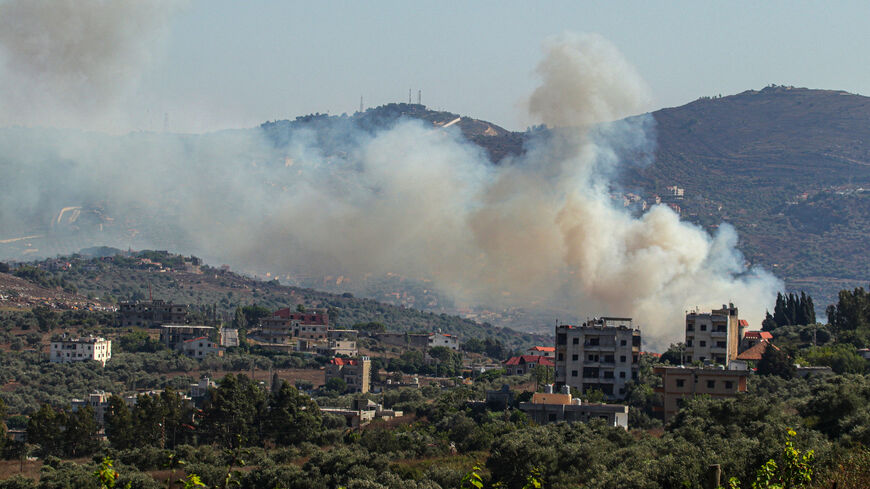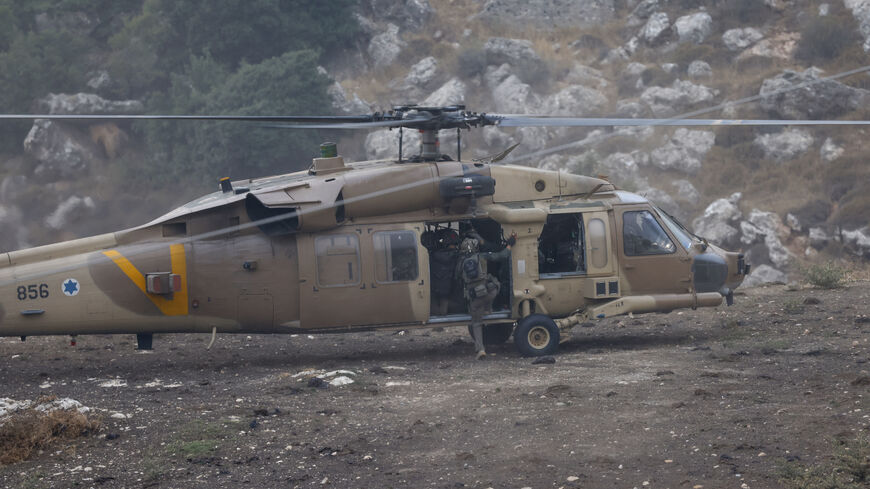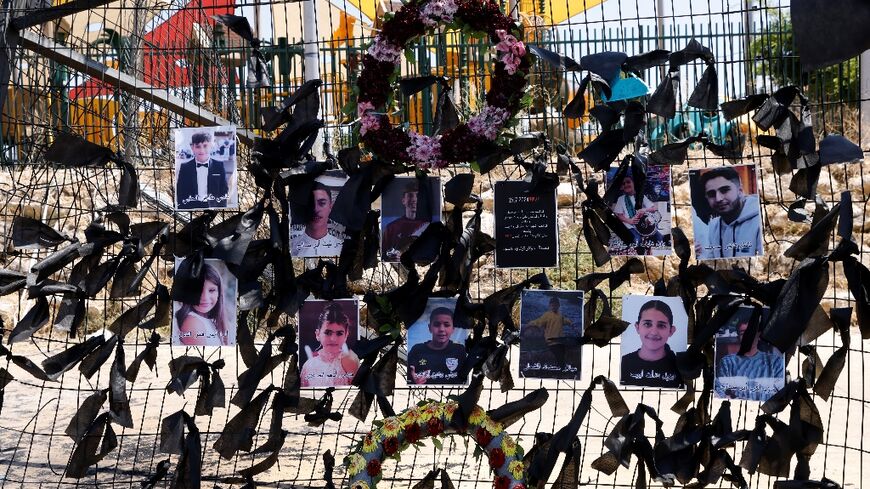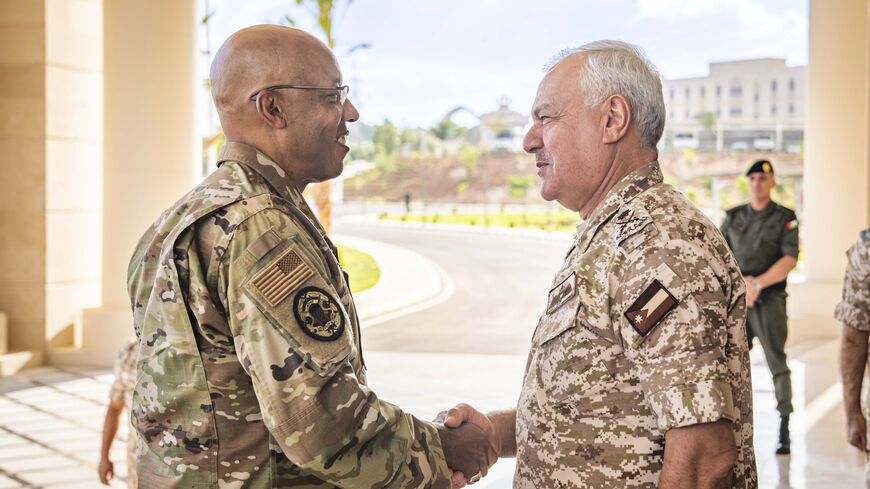Flight disruptions, panic in Lebanon amid efforts to avoid all-out Israel-Hezbollah war
The cross-border exchanges between Israel and Hezbollah have continued following the deadly rocket strike in the Golan Heights, which prompted Israeli threats to launch a wider response in Lebanon.
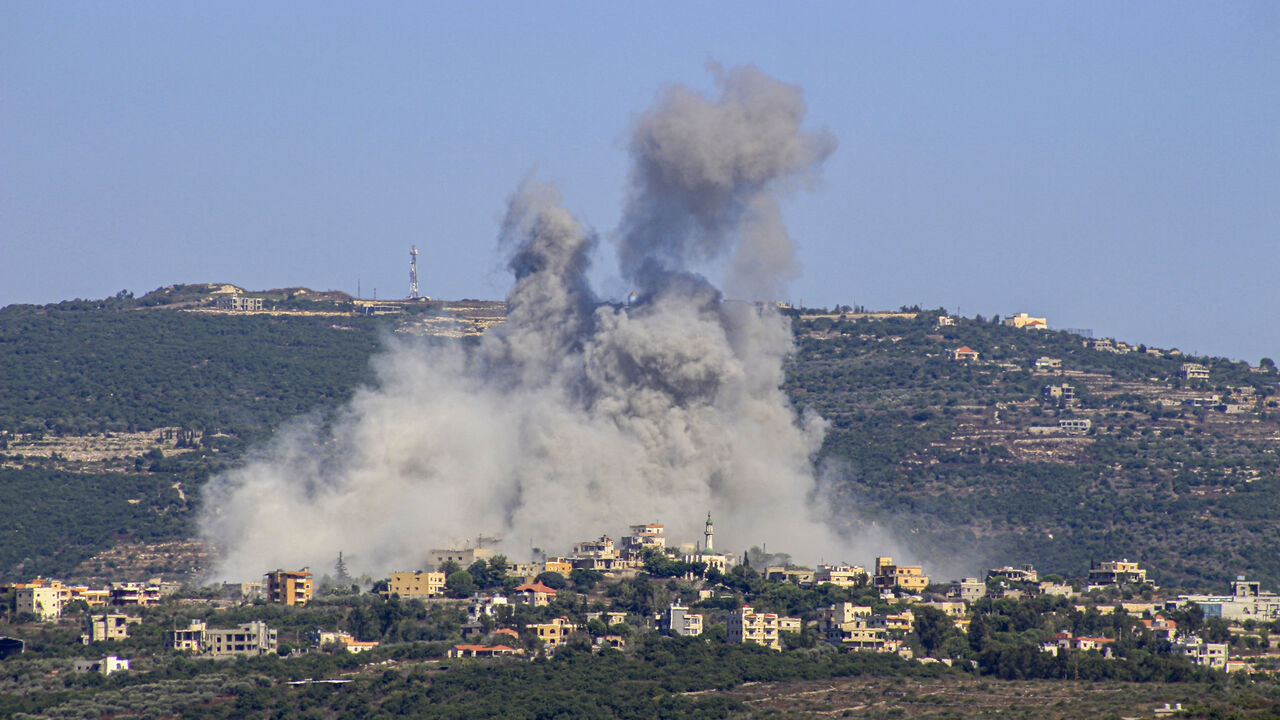
BEIRUT — The Israeli military continued its airstrikes in southern Lebanon Monday, with a drone attack killing two people, amid a flurry of diplomatic activity to prevent a full-scale war between Israel and Hezbollah following a weekend rocket strike that killed 12 people in the occupied Golan Heights.
An Israeli drone strike outside the southern Lebanese town of Shaqra killed at least two people and wounded several others, including a child.
According to Lebanon’s official National News Agency (NNA), an Israeli drone first hit a car on the road between the towns of Mays al-Jabal and Shaqra, resulting in two injuries. Another strike hit a motorcycle that approached the targeted car, killing the two people inside and injuring three others, including a child who was on the balcony of his house nearby.
The NNA did not specify whether the fatalities were Hezbollah fighters.
Hezbollah later issued two separate statements mourning the death of two of its fighters who were “martyred on the road to Jerusalem,” a phrase commonly used by the group in reference to its members killed in Israeli strikes since the cross-border hostilities began last October.
The statements identified them as Abbas Salami from Shaqra and Abbas Hijazi from Majdel Salm.
Also on Monday, Israeli fighter jets allegedly dropped white phosphorus munitions on the western outskirts of Mays al-Jabal, causing a massive fire in the vicinity of a landfill in the area, according to the NNA.
The Israeli army has not commented on the reports.
The military said Monday that several rockets were fired from Lebanon at the Gomeh Junction area, south of Kiryat Shmona. No injuries were reported.
Late on Sunday, Israeli air defenses intercepted a drone fired from Lebanon over the area of Western Galilee.
Majdal Shams attack aftermath
The cross-border exchanges on Monday seem to have fallen short of the harsh retaliation that Israel vowed to launch in response to Saturday’s rocket strike attributed to Hezbollah, in favor of the ongoing diplomatic efforts to prevent a full-blown conflict that could spiral into a wider regional war.
The strike hit a soccer field in the Druze town of Majdal Shams in the Israeli-controlled Golan Heights, killing 12 people, mostly children.
Israel occupied the Golan Heights following the 1967 war and unilaterally annexed the territory in 1981. The Golan Heights, which borders Syria, Lebanon, Jordan and Israel, is still recognized as part of Syrian territory by the international community.
While Hezbollah denied responsibility for Saturday’s attack, it has reportedly begun evacuating key locations in the south and east of Lebanon ahead of an imminent Israeli response.
Meanwhile, Hezbollah has started relocating some of its smart precision-guided missiles to unspecified locations to be used if Israel launches an attack, an official from the Lebanese group told The Associated Press on Monday.
The official said that while Hezbollah continues to stress that it does not seek a full-blown war with Israel, the group is ready to “fight without limits” in case one breaks out.
Following a three-hour meeting on Sunday, Israel's security cabinet authorized Prime Minister Benjamin Netanyahu and Defense Minister Yoav Gallant to decide the “manner and timing” of Israel’s response to the Majdal Shams attack.
It remains unclear what the nature of the Israeli action will be.
Israeli officials told Yedioth Ahronoth newspaper Monday that Israel wants to inflict a heavy blow to Hezbollah, without dragging the region into an all-out war.
Traffic outside Beirut intl airport after some flights cancelled overnight - some airlines have stopped flying to #Lebanon capital for next few days due to escalating tensions btw Hezbollah and Israel - security sources say Israeli drones were flying overhead most of the night pic.twitter.com/0JTbKPMsyM
— Zeina Khodr (@ZeinakhodrAljaz) July 29, 2024
The officials, who remained anonymous, were quoted as saying that the response would be "limited but significant."
Shortly after the Saturday evening attack, the Israeli military northern command started preparing and coordinating with the air force, the marine and army intelligence, different possibilities of retaliation against Hezbollah.
The military has been updating since the 2006 Second Lebanon War its so-called bank of targets. Heads of the different army corps discussed Saturday and Sunday the list of possible targets, as well as the extent of ammunition required for each such attack, reported Israeli news outlet Walla. According to the report, among the options being prepared is a widespread attack on Hezbollah targets in Lebanon.
In parallel, the Israeli military and the Shin Bet discussed Sunday the possible reactions of Hezbollah, should Israel indeed retaliate, including Hezbollah plans to invade Israel and entering into Israeli kibbutzim or villages in the north of the country. According to Walla’s report, the Israeli security agencies are not excluding Hezbollah will wake into action inactive, dormant assault cells in the West Bank.
Flight disruptions
Tensions were at a peak Sunday as Lebanon braced for a heavy response from Israel. Flights at Beirut International Airport were canceled and delayed as fears of an Israeli retaliation are growing.
The German airline group Lufthansa announced Monday the suspension of five routes to and from Beirut until Aug. 5 in light of the current developments.
In a similar move, Jordan's flag carrier, Royal Jordanian, also halted its flights to Beirut on Monday and Tuesday. The airline is assessing the situation in the country regarding Tuesday’s flights, it said in a statement.
Air France said it was suspending flights between Paris-Charles de Gaulle and Beirut on Monday and Tuesday due to the security situation in Lebanon.
Earlier on Sunday, Lebanon's Middle East Airlines said it had postponed the departures of some of its flights returning to Beirut overnight to Monday morning. Ethiopian Airlines also followed suit, announcing the cancellation of its flights to Lebanon on Sunday.
Diplomatic efforts to avert all-out war
Meanwhile, Western and regional actors were scrambling to avoid a full-blown escalation on the Lebanese front.
Lebanon’s caretaker Prime Minister Najib Mikati said in a statement Sunday that he held a series of contacts with international, European and Arab parties to “protect Lebanon and ward off dangers.”
He further stressed that the solution lies in a cease-fire to avoid dragging Lebanon into a war that could lead to “undesirable consequences.”
For his part, Lebanese caretaker Foreign Minister Abdallah Bou Habib told local media on Sunday that the United States, France and other countries were trying to contain the escalation.
“Israel will escalate in a limited way and Hezbollah will respond in a limited way. … These are the assurances we've received,” Bou Habib told Al Jadeed TV.
UK Foreign Secretary David Lammy said on Monday that he spoke with Mikati about the escalating tensions. In a post on the X platform, he said they both agreed that “widening of conflict in the region is in nobody’s interest.”
The United States said Sunday it has been in “continuous discussions” with both Israel and Lebanon since the Majdal Shams attack.
“The US is also working on a diplomatic solution along the Blue Line that will end all attacks once and for all, and allow citizens on both sides of the border to safely return to their homes,” National Security Council spokesperson Adrienne Watson said in a statement.
Watson further blamed Hezbollah for the attack and reiterated Washington's “ironclad and unwavering” support for Israel’s security.
France also stepped in. In a phone call with Netanyahu on Sunday, President Emmanuel Macron stressed that his country was ready to work to prevent a broader escalation between Israel and Hezbollah by “passing messages to all parties involved in the conflict," according to a statement by the Elysee Palace.
The statement said that Macron also urged the Israeli premier to do “everything to avoid a new escalation in the region,” and reiterated the need to reach a political solution on the Blue Line, which divides Lebanon from Israel and the Golan Heights.
Hezbollah fired the first rockets at northern Israel Oct. 8 in support of the Palestinian people, one day after Hamas’ unprecedented cross-border attack in southern Israel.
The Israeli army and Hezbollah have since been engaged in tit-for-tat exchanges. But Saturday’s attack, the deadliest in terms of civilian casualties since the hostilities began, raised the fears of an all-out war.
Lebanon is already grappling with a severe economic and political crisis. It has been without a president since October 2022 and has since been run by a caretaker government with limited powers.
Many blame Hezbollah for dragging the country into an unwanted war.

